The practice of embroidering or decorating book bindings has been around for quite a while, having been very popular in the Elizabethan era, but certainly dating to much earlier than merely 450 years ago. Until the age of mass-market books, we can safely say that books have always been precious commodities, so special books deserved to be adorned! A while ago, I mentioned a link to the British Library, where you can peruse heaps of gorgeous embroidered book bindings. Well, a reader has undertaken embroidering her own book cover, so I thought I’d send you for a peek!
Elmsley Rose has been working on a very nice embroidered book binding, and she’s been blogging her progress. Every time I check out the new additions, I get the stitching itch – I want to delve into the same type of project! But I’ll have to satisfy myself right now by just watching her work develop.
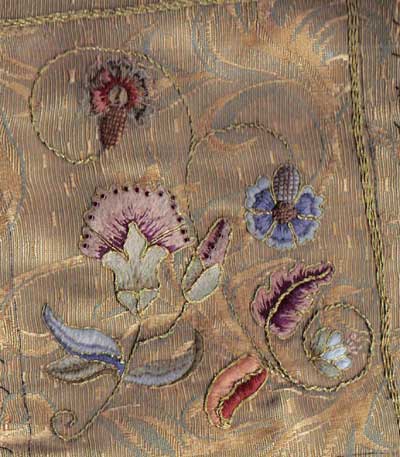
This is the cover so far. At first, when she started, I wondered if the background fabric might take away from the design, but as the embroidery progressed, I found I liked the background more and more. The embroidery pattern seems to move with the pattern in the fabric. Megan was inspired in the designing of her cover by a variety of historical sources, which she tells you about on her blog.
Take a look at all her posts on the embroidered bookbing – she takes you from the conception of the design up to her current point of accomplishment, unfolding her reasons for changes, and the whole thought, experimentation, and stitching process along the way.
Thanks to Megan’s enthusiasm for these bookbindings and historic embroidery, I found myself looking more and more into them, and getting more and more enthusiastic about embroidered book bindings, their history, and the variety of designs, techniques, and materials used to adorn books throughout the ages.
Besides the great collection at the British Library, you can find quite a few interesting resources about the subject on-line.
For example, on Project Gutenberg, you’ll find the book English Embroidered Bookbindings, which is full of excellent historical information, as well as plenty of plates in both black and white and color. This, for example, is plate 16 on page 54 – but don’t be deterred by the black and white photo! Think of the possibilities of the design!
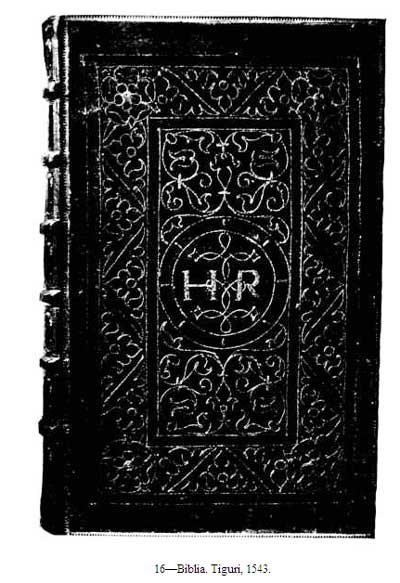
If you like plate 16 on pg 54 of English Embroidered Bookbindings, you’ll be happy to know that you can find the pattern for this bookbinding online, or at least, something very similar to it – the central panel (with the circle around the initials) is different, for example. Oh, the embroidery possibilities! For example, I’m a fan of velvet with goldwork on it – and I think this pattern would look great in that combination!
You can find a smattering of other articles on the subject here and there around the internet.
If you know of any other resources on the topic, feel free to share them with us! Also, if you’re working on anything similar, I’d love to see it. Feel free to post a link to your project photos, or e-mail and send a photo!


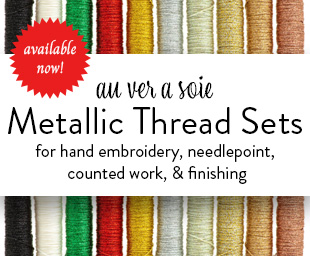
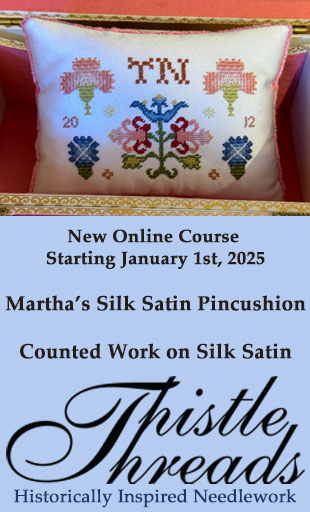
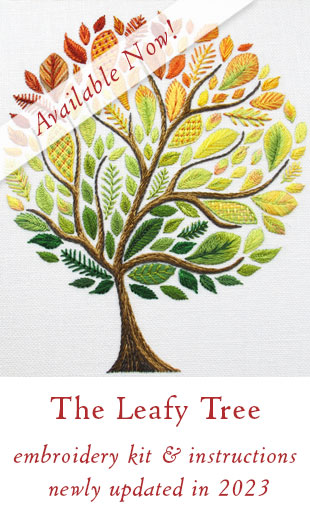

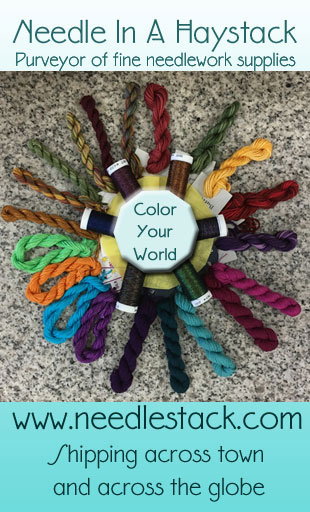
Thankyou so much Mary!
A couple of articles on how to make book covers (with your embroidered panels stitched on)
are
http://tinyurl.com/298rhe
and another, by Lady Martel (both of these are SCA articles).
I prefer the Lady Martel one – but can’t find it on-line.
In case anyone has a hankering for it, I’ll put it in my blog.
Thanks, E-R – Yes, please do put it on your blog! I’d love to read it!
Dear Mary
All these articles about ancient embroidery is a real treasure for me. This post is so complete.
Thank you and Merry Christmas and new year better!!!
Maria del Valle
Thanks, Maria! Once you start reading up on this stuff and taking a look at all the examples, it’s pretty captivating, isn’t it?
I just ran across another on-line version of English Embroidered Bookbindings today at the following location:
http://www.archive.org/details/englishbookbindings00davenuoft
Here’s a direct link to one of the PDF versions:
http://www.archive.org/download/englishbookbindings00davenuoft/EnglishBookBinding-enriched.pdf
I think some of the images are better than the ones on the Project Gutenberg site. In some cases I see a little more detail.
It’s great having access to both versions!
Thanks for that, Margaret. Any more detail we can get is a good thing!
Thank you for a wonderfully comprehensive and inspiring website, for sharing your knowledge and giving us all a reason to go out and buy supplies to grow our stash.
I have embroidered a number of Lesley T-D’s designs and I love the freedom she encourages at the same time as using traditional stitches, even if they are somewhat altered.
I look forward to your newsletter and enjoy them all.
Paddy Balsdon
Johannesburg, South Africa